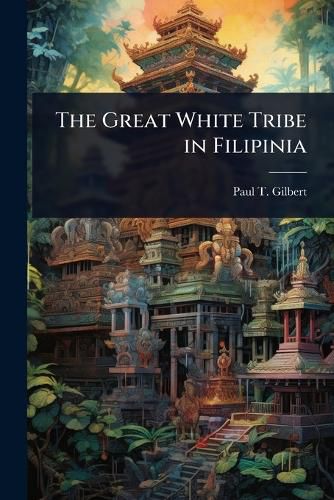Readings Newsletter
Become a Readings Member to make your shopping experience even easier.
Sign in or sign up for free!
You’re not far away from qualifying for FREE standard shipping within Australia
You’ve qualified for FREE standard shipping within Australia
The cart is loading…






"The Great White Tribe in Filipinia" offers a fascinating glimpse into the early 20th-century American colonial experience in the Philippines. Paul T. Gilbert recounts his observations and reflections on the interactions between Americans and Filipinos during a period of significant cultural exchange and societal transformation. The book provides insights into the attitudes, perceptions, and challenges faced by both groups as they navigated the complexities of colonial rule.
Gilbert's narrative captures the essence of the era, shedding light on the social dynamics, political landscape, and everyday life in the Philippines under American administration. It serves as a valuable historical document, offering a unique perspective on a pivotal moment in the history of both the United States and the Philippines.
This work has been selected by scholars as being culturally important, and is part of the knowledge base of civilization as we know it. This work was reproduced from the original artifact, and remains as true to the original work as possible. Therefore, you will see the original copyright references, library stamps (as most of these works have been housed in our most important libraries around the world), and other notations in the work.
This work is in the public domain in the United States of America, and possibly other nations. Within the United States, you may freely copy and distribute this work, as no entity (individual or corporate) has a copyright on the body of the work.
As a reproduction of a historical artifact, this work may contain missing or blurred pages, poor pictures, errant marks, etc. Scholars believe, and we concur, that this work is important enough to be preserved, reproduced, and made generally available to the public. We appreciate your support of the preservation process, and thank you for being an important part of keeping this knowledge alive and relevant.
$9.00 standard shipping within Australia
FREE standard shipping within Australia for orders over $100.00
Express & International shipping calculated at checkout
"The Great White Tribe in Filipinia" offers a fascinating glimpse into the early 20th-century American colonial experience in the Philippines. Paul T. Gilbert recounts his observations and reflections on the interactions between Americans and Filipinos during a period of significant cultural exchange and societal transformation. The book provides insights into the attitudes, perceptions, and challenges faced by both groups as they navigated the complexities of colonial rule.
Gilbert's narrative captures the essence of the era, shedding light on the social dynamics, political landscape, and everyday life in the Philippines under American administration. It serves as a valuable historical document, offering a unique perspective on a pivotal moment in the history of both the United States and the Philippines.
This work has been selected by scholars as being culturally important, and is part of the knowledge base of civilization as we know it. This work was reproduced from the original artifact, and remains as true to the original work as possible. Therefore, you will see the original copyright references, library stamps (as most of these works have been housed in our most important libraries around the world), and other notations in the work.
This work is in the public domain in the United States of America, and possibly other nations. Within the United States, you may freely copy and distribute this work, as no entity (individual or corporate) has a copyright on the body of the work.
As a reproduction of a historical artifact, this work may contain missing or blurred pages, poor pictures, errant marks, etc. Scholars believe, and we concur, that this work is important enough to be preserved, reproduced, and made generally available to the public. We appreciate your support of the preservation process, and thank you for being an important part of keeping this knowledge alive and relevant.